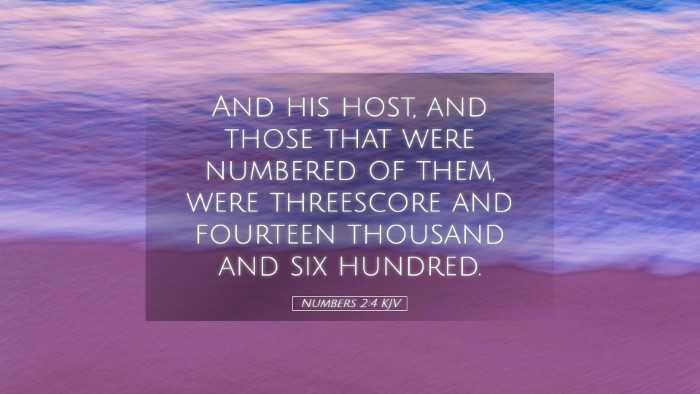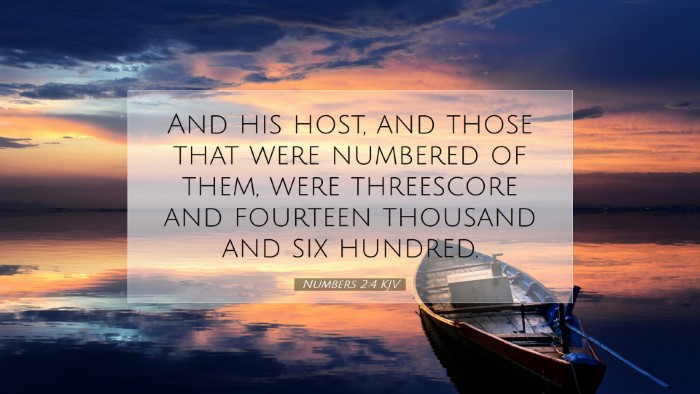Commentary on Numbers 2:4
Verse: Numbers 2:4 - "And his host, and those that were numbered of them, were fifty and seven thousand and four hundred."
Overview
Numbers 2:4 is part of the larger context of the Book of Numbers, which details the organization and numbering of the Israelite tribes as they camped in the wilderness. This verse specifically pertains to the tribe of Judah, which is highlighted for its leadership role and prominence among the twelve tribes of Israel.
Insights from Public Domain Commentaries
Matthew Henry's Commentary
Matthew Henry emphasizes the significance of the tribe of Judah, noting that it was destined to lead the other tribes both in the order of encampment and in the eventual conquest of Canaan. He points out that Judah's number – 74,600 – symbolizes not just a physical army, but a spiritual entity meant to invoke trust in God's provision.
Henry further explains that the numbering was not merely a census but had divine implications. The larger context of the Israelites in the wilderness signifies the need for organization and preparation as they journey towards the Promised Land. He mentions the leadership qualities attributed to Judah, citing the messianic prophecy that arises from this tribe (Genesis 49:10), reinforcing its central role in God’s salvific plan.
Albert Barnes' Notes
Albert Barnes provides a detailed exposition of the numbers presented in the verse. According to Barnes, the 74,600 count of the men of Judah signifies the power and might of this tribe, establishing it as a formidable force among the Israelites. He notes that the tribe's positioning on the eastern side of the Tabernacle indicates its prominence and leadership role.
Barnes also underscores the importance of order within the Israelite camp. He associates the tribal organization with God’s divine plan for His people, highlighting that the specific arrangement reflects both God's favor and a call to unity among the tribes. Each tribe's role contributes to the overall mission of Israel as a holy nation, and the numbering serves to affirm each tribe's identity and calling.
Adam Clarke's Commentary
Adam Clarke expands on the significance of Judah's numerical representation, interpreting the 74,600 fighting men as an assurance of strength and divine endorsement. Clarke mentions the historical context of these numbers, emphasizing that they denote not only military power but also the intended leadership roles of these tribes.
Clarke articulates that the mention of Judah prior to the other tribes sets a precedence for his descendants and future leaders, especially in light of David and the messianic lineage that stems from Judah. He elaborates on the symbolic representation of the tribes, explaining that each number reflects a broader theological truth: God's providence over each tribe and the meticulous planning of their journey towards the Promised Land.
Theological Considerations
The verse opens up avenues for theological reflection, particularly in how God organizes His people. The numerical detail signifies divine order amidst chaos, which may resonate deeply with pastors and theologians engaged in church leadership and structure. Furthermore, the tribe of Judah serves as a metaphor for the Church's calling – leading with strength, purpose, and divine guidance.
Practical Applications
For pastors, Numbers 2:4 and its surrounding context challenge leaders to consider the importance of organizational structure within their congregations. Just as Judah was chosen for leadership, modern church leadership must recognize their roles in the context of God’s broader mission for His people.
- Leadership: Emulate the tribal leadership model; involve members in significant roles.
- Trust in God: Encourage reliance on God for provision and strength, similar to how the Israelites depended on God in the wilderness.
- Community Identity: Recognize the importance of each member's role in the community, as each tribe had a part to play within Israel.
Conclusion
Numbers 2:4 encapsulates essential themes of leadership, identity, and divine organization integral to the identity of the nation of Israel. Drawing from the insights of respected commentaries, this passage serves not only as historical record but also as a profound lesson for believers today, encouraging them to understand their part in God’s grand design.


